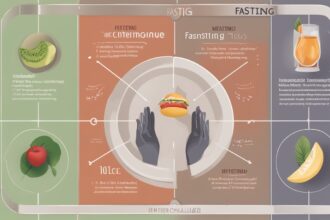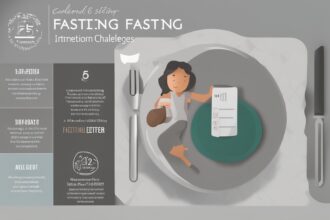Fasting, whether for religious, health, or personal reasons, is a practice that tests both mental and physical resilience. One of the most significant hurdles faced during fasting is managing hunger. The sensation of hunger can be overwhelming, especially during extended fast periods, but with the right strategies, it is possible to overcome this challenge. This post explores practical and effective ways to conquer hunger during fasting, ensuring you stay committed to your goals without compromising your well-being.
Understanding Hunger During Fasting
Hunger during fasting is a natural response of the body as it adjusts to the absence of regular food intake. When you fast, your body switches from using glucose as its primary energy source to burning stored fat. This metabolic shift can trigger hunger hormones like ghrelin, which signal to your brain that it’s time to eat. Understanding that hunger is often temporary and part of the fasting process can help you mentally prepare for it. Additionally, distinguishing between true hunger and psychological cravings is key to overcoming hunger during fast periods. True hunger is a physical need for nourishment, while cravings are often tied to habits or emotions.
Stay Hydrated to Curb Hunger Pangs
One of the simplest yet most effective ways to manage hunger during fasting is to stay hydrated. Dehydration can often masquerade as hunger, intensifying your desire to eat. Drinking plenty of water throughout your fasting window can help fill your stomach temporarily and reduce hunger pangs. Herbal teas or black coffee (without sugar or cream) can also be helpful for those observing fasts that allow non-caloric beverages. Aim to sip water consistently rather than chugging large amounts at once, as this can help maintain a feeling of fullness. For more insights on hydration during fasting, check out our post on Hydration Tips for Fasting Success.
Distract Yourself with Mindful Activities
Keeping your mind occupied is a powerful strategy for overcoming hunger during fast periods. When hunger strikes, engage in activities that divert your attention from food. This could include reading, meditating, going for a walk, or tackling a small project. Mindfulness practices, such as deep breathing or journaling, can also help you acknowledge hunger without acting on it. By focusing on non-food-related tasks, you train your brain to resist the urge to eat. If you’re new to mindfulness, explore our guide on Mindfulness Techniques for Fasting to learn more about staying present during challenging moments.
Plan Your Eating Windows Strategically
For those practicing intermittent fasting, strategically planning your eating windows can make a significant difference in managing hunger. Eating nutrient-dense meals rich in protein, fiber, and healthy fats before starting your fast can help you feel fuller for longer. Foods like eggs, avocados, and whole grains release energy slowly, preventing rapid spikes and drops in blood sugar that can trigger hunger. Additionally, breaking your fast with a balanced meal rather than indulging in sugary or processed foods can stabilize your appetite. To dive deeper into meal planning, read our article on Creating Effective Intermittent Fasting Meal Plans.
Manage Stress to Reduce Hunger Hormones
Stress and anxiety can exacerbate feelings of hunger by increasing levels of cortisol, a hormone that stimulates appetite. During fasting, it’s crucial to keep stress in check to avoid unnecessary cravings. Incorporate stress-relief techniques such as yoga, light exercise, or listening to calming music into your routine. Adequate sleep is also essential, as lack of rest can disrupt hunger-regulating hormones like leptin and ghrelin. By prioritizing relaxation and rest, you can better control hunger during fasting. For more on this topic, see our post on How Stress Impacts Fasting.
Build Mental Resilience to Overcome Cravings
Overcoming hunger during fast periods often comes down to mental strength. Remind yourself of the reasons behind your fast—whether it’s for spiritual growth, health benefits, or personal discipline. Setting clear intentions and visualizing your success can help you push through tough moments. It’s also helpful to anticipate hunger and have a mental script ready, such as telling yourself, “This feeling will pass, and I am stronger for enduring it.” Joining a fasting community or support group can provide encouragement and accountability. Learn more about building mental toughness with our guide on Developing Mental Strength for Fasting.
Disclaimer: The information provided in this post is for general informational purposes only and should not be considered medical advice. Fasting may not be suitable for everyone, especially individuals with certain medical conditions, pregnant or breastfeeding women, or those with a history of eating disorders. Always consult a healthcare professional or dietitian before starting any fasting regimen to ensure it is safe for your individual health needs.
References
- Harvard Health Publishing – Intermittent Fasting: Surprising Update
- Mayo Clinic – Fasting Diet: Can It Improve My Health?
- National Center for Biotechnology Information – Effects of Intermittent Fasting on Health, Aging, and Disease
- WebMD – 10 Ways to Stop Hunger Pangs
- American Heart Association – How to Manage Hunger
This content is for informational purposes only and not a substitute for professional advice.






